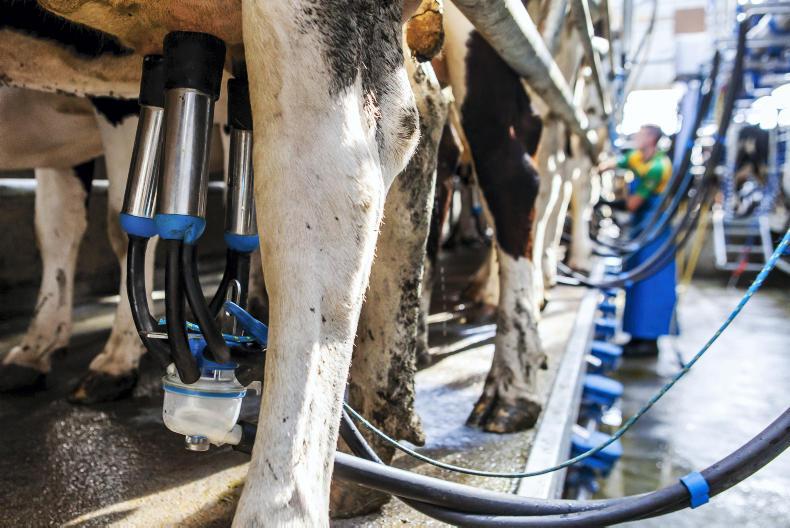As part of COVID-19 contingency plans, the Irish Farmers Journal understands that milk processors are discussing options to reduce milk supply during the peak supply months.
One of the options being discussed is to enforce a long term period of once a day milking throughout the peak milk supply and peak coronavirus outbreak period. Other options include shorter term periods of once a day or restricted milk intake in the event of a plant having to close.
If cows were milked once a day during April, May and June it would likely cost Irish farmers €301 million in lost milk sales, or €16,722 per farm on average.
In 2019, there was 3.04 billion litres of milk produced in Ireland during the months of April, May and June.
Presuming the same level of output for 2020, if once a day milking is enforced it would be likely to reduce supply by 912 million litres.
This is based on Teagasc research showing a 30% reduction in milk yield when cows are milked once a day. It does not factor in the reduction in yield after the once a day period is over.
It is difficult to predict the long term effects on yield, but a 20% reduction in the expected twice a day yield would not be unexpected. For cows 70 days plus into lactation, this could mean a reduction of up to 800 litres per cow across the full lactation, costing €264/cow.
This is on top of the loss of production during the period while cows are on once a day. Based on a milk price received of 33c/l, the cost of the measure would be €301 million for the three month period.
Some of this lost income could be offset by higher milk constituents and slightly lower operating costs at farm level.
However, if this measure was adapted without appropriate compensation, it would have catastrophic consequences for dairy farm profitability in 2020.
The Irish Farmers Journal understands that this measure is being discussed as a means of creating extra processing capacity in the event that a milk plant has to close due to the workforce contracting coronavirus.
In such a scenario, milk intended for that factory would be processed elsewhere, utilising the spare capacity generated by the reduced supply from once a day milking.
In summary, dairy industry executives will be deciding over the coming days and weeks the strategy that they are going to implement for COVID-19.
The options include: 1) long term once a day milking for up to three months, 2) shorter term once a day milking for two to four weeks at peak, or 3) don’t enforce any supply restrictions and take action if an issue arises.
Read more
Coronavirus likely to cause ‘material disruption’ to milk processing – Co-ops
Dairy industry frustrated at lack of EU action on market supports
Coronavirus: what farmers need to know about self isolating
As part of COVID-19 contingency plans, the Irish Farmers Journal understands that milk processors are discussing options to reduce milk supply during the peak supply months.
One of the options being discussed is to enforce a long term period of once a day milking throughout the peak milk supply and peak coronavirus outbreak period. Other options include shorter term periods of once a day or restricted milk intake in the event of a plant having to close.
If cows were milked once a day during April, May and June it would likely cost Irish farmers €301 million in lost milk sales, or €16,722 per farm on average.
In 2019, there was 3.04 billion litres of milk produced in Ireland during the months of April, May and June.
Presuming the same level of output for 2020, if once a day milking is enforced it would be likely to reduce supply by 912 million litres.
This is based on Teagasc research showing a 30% reduction in milk yield when cows are milked once a day. It does not factor in the reduction in yield after the once a day period is over.
It is difficult to predict the long term effects on yield, but a 20% reduction in the expected twice a day yield would not be unexpected. For cows 70 days plus into lactation, this could mean a reduction of up to 800 litres per cow across the full lactation, costing €264/cow.
This is on top of the loss of production during the period while cows are on once a day. Based on a milk price received of 33c/l, the cost of the measure would be €301 million for the three month period.
Some of this lost income could be offset by higher milk constituents and slightly lower operating costs at farm level.
However, if this measure was adapted without appropriate compensation, it would have catastrophic consequences for dairy farm profitability in 2020.
The Irish Farmers Journal understands that this measure is being discussed as a means of creating extra processing capacity in the event that a milk plant has to close due to the workforce contracting coronavirus.
In such a scenario, milk intended for that factory would be processed elsewhere, utilising the spare capacity generated by the reduced supply from once a day milking.
In summary, dairy industry executives will be deciding over the coming days and weeks the strategy that they are going to implement for COVID-19.
The options include: 1) long term once a day milking for up to three months, 2) shorter term once a day milking for two to four weeks at peak, or 3) don’t enforce any supply restrictions and take action if an issue arises.
Read more
Coronavirus likely to cause ‘material disruption’ to milk processing – Co-ops
Dairy industry frustrated at lack of EU action on market supports
Coronavirus: what farmers need to know about self isolating






 This is a subscriber-only article
This is a subscriber-only article










SHARING OPTIONS: